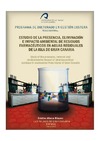Please use this identifier to cite or link to this item:
https://accedacris.ulpgc.es/jspui/handle/10553/41794
| Title: | Estudio de la presencia, eliminación e impacto ambiental de residuos farmacéuticos en aguas residuales de la isla de Gran Canaria | Other Titles: | Study of the presence, removal and environmental impact of pharmaceutical residues in wastewater from island of Gran Canaria | Authors: | Afonso Olivares, Cristina | Director: | Santana Rodríguez, José Juan Sosa Ferrera, María Zoraida Doña Rodríguez, José Miguel |
UNESCO Clasification: | 330530 Alcantarillado y depuración de aguas 330807 Eliminación de residuos 330810 Tecnología de aguas residuales |
Keywords: | Depuración de aguas residuales | Issue Date: | 2017 | Abstract: | En apenas los últimos veinte años ha aumentado la preocupación de
la comunidad científica por la presencia de nuevos contaminantes,
considerados emergentes, en los diferentes compartimentos ambientales,
así como, sobre sus posibles consecuencias negativas para los seres vivos.
Sin embargo, su control y regulación avanza muy lentamente, por lo que
se necesita seguir investigando, sobretodo, el comportamiento de
aquellos grupos de compuestos que son considerados una amenaza, con
el fin de obtener los suficientes datos para poder concretar las medidas
necesarias.
En este sentido, los compuestos farmacéuticos, los cuales son
usados de manera continua y extensa, son persistentes debido a su baja
biodegradabilidad y presentan una cierta toxicidad, han sido
monitorizados y detectados en muestras hidrológicas, especialmente,
debido a su ruta principal de entrada después de ser consumidos y
excretados por humanos y animales. Este tipo de estudios no hubiese sido posible sin la existencia y desarrollo de metodologías analíticas cada vez
más amigables con el propio medioambiente sin dejar de ser sensibles,
selectivas y robustas. Sin embargo, aunque haya una gran disponibilidad
de datos sobre la presencia de los fármacos en el medioambiente, todavía
quedan zonas geográficas con características particulares donde no se han
estudiado en profundidad... In just the last twenty years the scientific community concern have increased due to the presence of new pollutants, which are considered emerging, in the different environmental compartments, as well as, their possible negative consequences for living beigns. However, its control and regulation progress very slowly, so we need further research, especially, the behavior of those groups of compounds that are considered a threat, in order to obtain sufficient data to be able to specify the necessary mea sures. In this sense, pharmaceutical compounds, which are used continuously and extensively, are persistent due to their low biodegradability and have a certain toxicity, have been monitored and detected in hydrological samples, due to their main route of entry after their consumption and excretion by humans and animals. Such studies would not have been possible without the existence and development of analytical methodologies that are increasingly friendly to the environment, while being sensitive, selective and robust. However, although there is a high availability of data on the presence of drugs in the environment, there are still geographical areas with particular characteristics where they have not been studied in depth... |
Description: | Programa de doctorado: Gestión costera. | Department: | Departamento de Química | Faculty: | Facultad de Ciencias del Mar | URI: | https://accedacris.ulpgc.es/handle/10553/41794 |
| Appears in Collections: | Tesis doctoral |
Page view(s)
256
checked on Sep 16, 2023
Download(s)
487
checked on Sep 16, 2023
Google ScholarTM
Check
Share
Export metadata
Items in accedaCRIS are protected by copyright, with all rights reserved, unless otherwise indicated.
